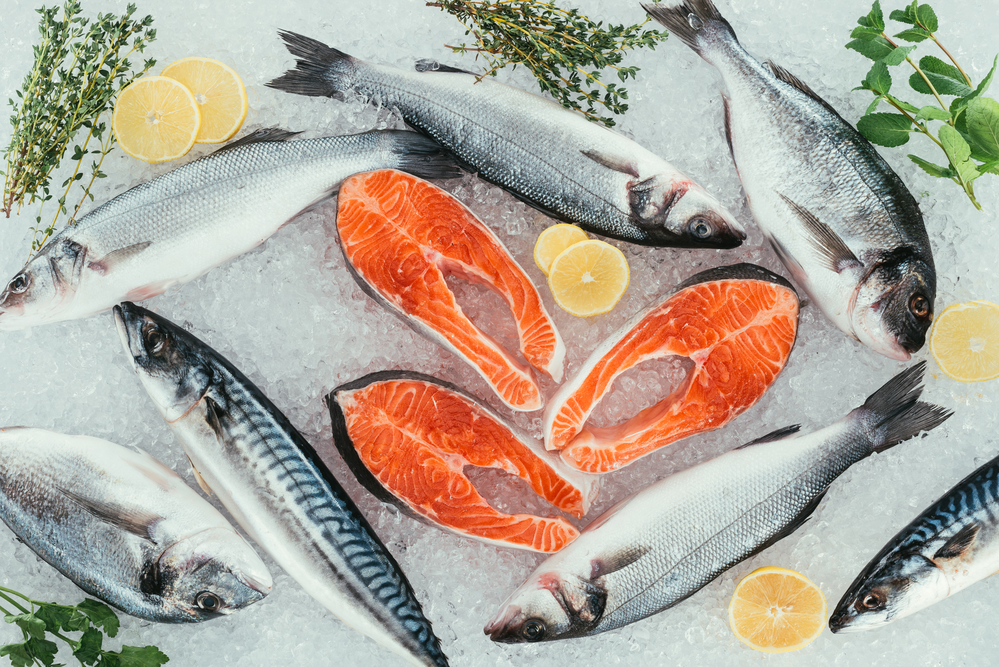There is a common misconception that fish should be avoided during pregnancy due to the risk of mercury and listeria toxicity. While these are a risk, you don’t need to avoid them altogether. You just need to know which fish to eat and which to avoid, and that is going to become a lot clearer for you today.
Why do you need to be careful?
Mercury
Mercury is a heavy metal found naturally in the environment, but also due to human activities sources such as the burning of fossil fuels, mining and manufacturing. Fish absorb mercury into their tissues through their gills as they swim and through their digestive tracts as they feed. In high quantities, mercury is toxic to the nervous system and especially dangerous during pregnancy. High mercury levels can result in your baby having some developmental delays and possible brain damage. However, mercury is only dangerous when it is consumed at high levels.
All fish contains a small amount of mercury. The higher up the food chain a fish is, the more mercury it will contain. For example, larger carnivorous fish will contain more mercury than small herbivorous fish. For this reason, fish to avoid include shark, swordfish, tilefish and king mackerel. Fish lower on the food chain which is safe to consume in pregnancy includes sardines, trout, salmon, tuna and cod.
The benefits of fish during pregnancy usually outweigh the risk of mercury toxicity if you choose fish which have lower levels of mercury, such as those mentioned above.
Listeria
Listeria, also known as listeria monocytogenes, is a type of bacteria commonly found in raw foods that can grow in cold temperatures, such as the fridge. Although relatively rare, pregnant women are at higher risk of infection from listeria than the general population. To reduce the risk of listeria infection, cook your fish before you eat it to kill any of the harmful bacteria.
What are the benefits of fish for you and your baby?
Omega-3 fatty acids
The main benefit of fish is its omega-3 fatty acids which are essential for the development of your baby’s eyes and brain and lacking in these can increase your risk of postnatal depression.
Protein
Fish is also a rich source of protein which is essential for a successful pregnancy and plays an important role in the production of new hormones important for growth of fetal tissues, including the brain.
Iodine
This is essential for the development of your baby’s nervous system including the brain and also helps regulate your baby’s metabolism.
Vitamin D
Vitamin D is needed for muscle and bone strength and helps the body absorb calcium. Deficiencies can affect birth weight which can result in growth retardation and skeletal deficiencies if your baby is deficient in Vitamin D.
How much fish should you be eating?
When looking at advice online about certain fish types, the advice given will vary depending on the environment and country you live in because of the varying levels of mercury. In Australia and New Zealand the recommendations are:
2-3 serves of fish per week (100g = 1 serve).
1 serve per week if it’s Orange Roughy (Deep Sea Perch) or Catfish with no other fish that week.
1 serve per fortnight if it’s Shark (Flake) or Billfish (Swordfish/Broadbill, and Marlin) with no other fish consumed that fortnight.
For some ideas of how to include fish in your diet while pregnant, check out my ‘Fish safe for pregnancy – what kind and how much’ video on my YouTube channel Nourish for more information.
You may also like to read:
Too fishy. Getting Omega 3 for kids… without fish
Food and Fertility: What should you eat (and NOT eat) when trying to conceive









